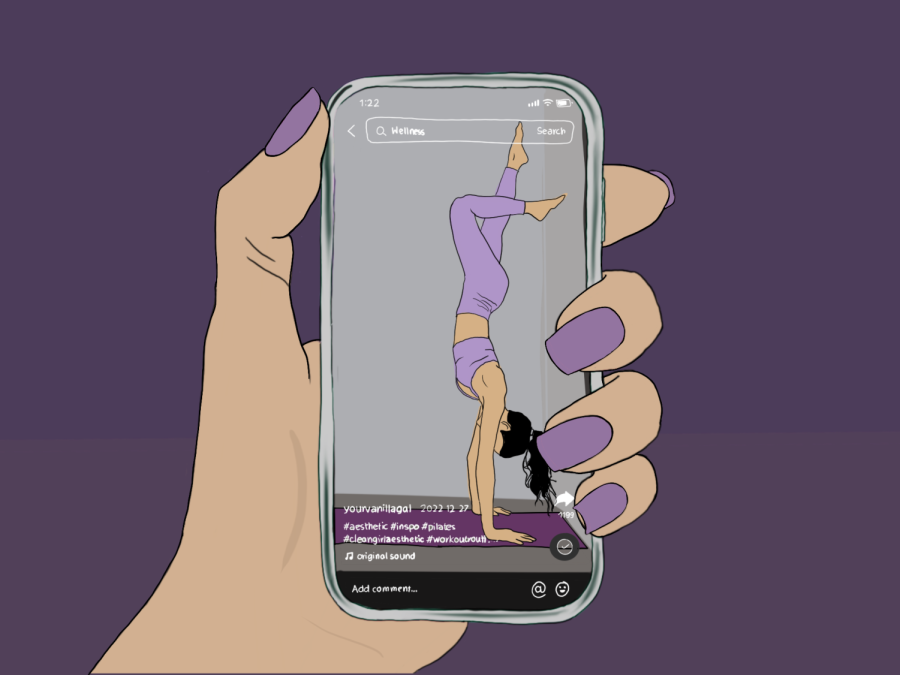As aesthetic videos of girls flaunting their flawless morning routines — complete with perfectly dewy skincare steps, workout regimens and trendy diets — filled your TikTok feed, you began to question your own habits introspectively. You stocked up on the latest beauty fads, a life-savings worth of athleisure and green juices. You worked out incessantly, and started a manic bullet journal — all in a desperate attempt to emerge from pandemic-induced confinement as the idealized version of yourself.
Or so you thought.
Wellness culture’s grip on society has never been stronger, and it has morphed into an unrealistic set of commandments — rules to follow without question. Driven by unattainable, superficial comparison and void of empiricism, the wellness movement encourages strict adherence, with undercurrents of shame and guilt if not rigidly followed.
Social media’s infamously deceptive nature has fueled this shift, with influencers portraying an unattainable level of self-proclaimed perfection by disguising it as wellness. Who wouldn’t want to transform themselves from being unproductive, unfit and mundane to efficient, sharply dressed and in-shape? Harmless as it may appear, this rhetoric fuels the dangerous fire that is wellness culture.
One of TikTok’s leading faces in this trend is Alay Bowker, an influencer and model with a cult following. Her 1.1 million followers are bombarded with a seemingly never-ending flaunting of her physical transformation and supposed secret to a healthy and happy lifestyle.
With videos like “7 healthy habits that changed my life,” “Let me show you my bloating hacks that actually work” and “Want a toned stomach? Try this workout,” Bowker’s message seems simple: Follow her deliciously curated wellness routine, and you’ll achieve her coveted lifestyle. However, it is not as clear cut as that may appear.
Critics have accused wellness influencers of promoting damaging habits and perpetuating unattainable standards. As a broad rebuttal, Bowker claims to have simply listened to her body and transformed her mindset, suggesting that her physical transformation was no more than an added benefit.
“It was only when I put in the hard work to change my mindset, to start trusting myself to tell me what food I needed, to listen to my cravings, and all of that — that’s what has helped me to get where I am now,” she said in a March 2022 TikTok.
But what if one’s cravings aren’t nutrient-dense or packed with purposeful ingredients? Average people do not have the time — nor, in many cases, the resources — for 7 a.m. hikes, homemade meals, stretch routines and daily journaling.
Using her background in chemical engineering, @foodsciencebabe uses empirical evidence to educate her almost 350,000 TikTok followers on food science. In a response to a recent interview in which actress Gwyneth Paltrow glorified dangerous habits disguised as wellness, @foodsciencebabe said, “The entire point of wellness — wellness — not actual wellness, is to have something that most people can’t have, is to be superior, is to do things that are only available to ‘superior’ people.”
Whether or not Bowker exhibits potentially dangerous eating behavior, the very existence of her account is harmful. It is a fruitless attempt to guide people — particularly young and impressionable people — to maintain a utopian lifestyle that is inherently unhealthy and obsessive. Social media presents an idealized version of reality, and there is no doubt that the media shared across these platforms will influence individuals who interact with it. Influencers dedicate a tremendous amount of time and money, curating a highly specific stream of content that caters to a specific audience and has clear goals — not to mention often being motivated by a desire for popularity.
The fundamental issue with wellness culture is not that people are investing in their health and well-being, but rather the unrealistic standards that it promotes across social media. This leads to cycles of comparison, self-doubt, body dissatisfaction and potentially self-injurious behavior.
Moving away from a one-size-fits-all approach to wellness is imperative to prioritizing mental and physical health. It starts by acknowledging the need to embrace an increasingly personalized approach to health, in which individuals can determine what works best for them and, most importantly, what is most sustainable.

























































































































































